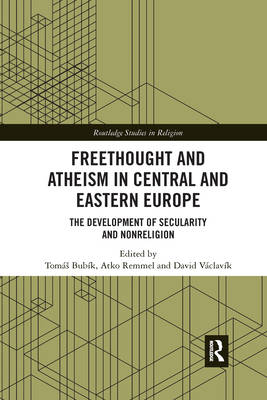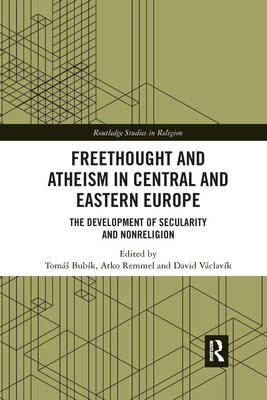
- Afhalen na 1 uur in een winkel met voorraad
- Gratis thuislevering in België vanaf € 30
- Ruim aanbod met 7 miljoen producten
- Afhalen na 1 uur in een winkel met voorraad
- Gratis thuislevering in België vanaf € 30
- Ruim aanbod met 7 miljoen producten
Freethought and Atheism in Central and Eastern Europe
The Development of Secularity and Non-Religion
Omschrijving
This book provides the first comprehensive overview of atheism, secularity and non-religion in Central and Eastern Europe in the twentieth and twenty-first centuries. In contrast to scholarship that has focused on the 'decline of religion' and secularization theory, the book builds upon recent trends to focus on the 'rise of non-religion' itself. While the label of 'post-communism' might suggest a generalized perception of the region, this survey reveals that the precise developments in each country before, after and even during the communist era are surprisingly diverse.
A multinational team of contributors provide interdisciplinary case studies covering Estonia, Latvia, Lithuania, Russia, Ukraine, Poland, the Czech Republic, Slovakia, Hungary, Croatia, Romania and Bulgaria. This approach utilises perspectives from social and intellectual history in combination with sociology of religion in order to cover the historical development of secularity and secular thought, complemented with sociological data. The study is framed by methodological and analytical chapters.
Offering an important geographical perspective to the study of freethought, atheism, secularity and non-religion, this wide-ranging book will be of significant interest to scholars of twentieth-century social and intellectual history, sociology of religion and non-religion, cultural and religious studies, philosophy and theology.
Specificaties
Betrokkenen
- Uitgeverij:
Inhoud
- Aantal bladzijden:
- 348
- Taal:
- Engels
- Reeks:
Eigenschappen
- Productcode (EAN):
- 9781032173795
- Verschijningsdatum:
- 30/09/2021
- Uitvoering:
- Paperback
- Formaat:
- Trade paperback (VS)
- Afmetingen:
- 156 mm x 234 mm
- Gewicht:
- 485 g

Alleen bij Standaard Boekhandel
Beoordelingen
We publiceren alleen reviews die voldoen aan de voorwaarden voor reviews. Bekijk onze voorwaarden voor reviews.










